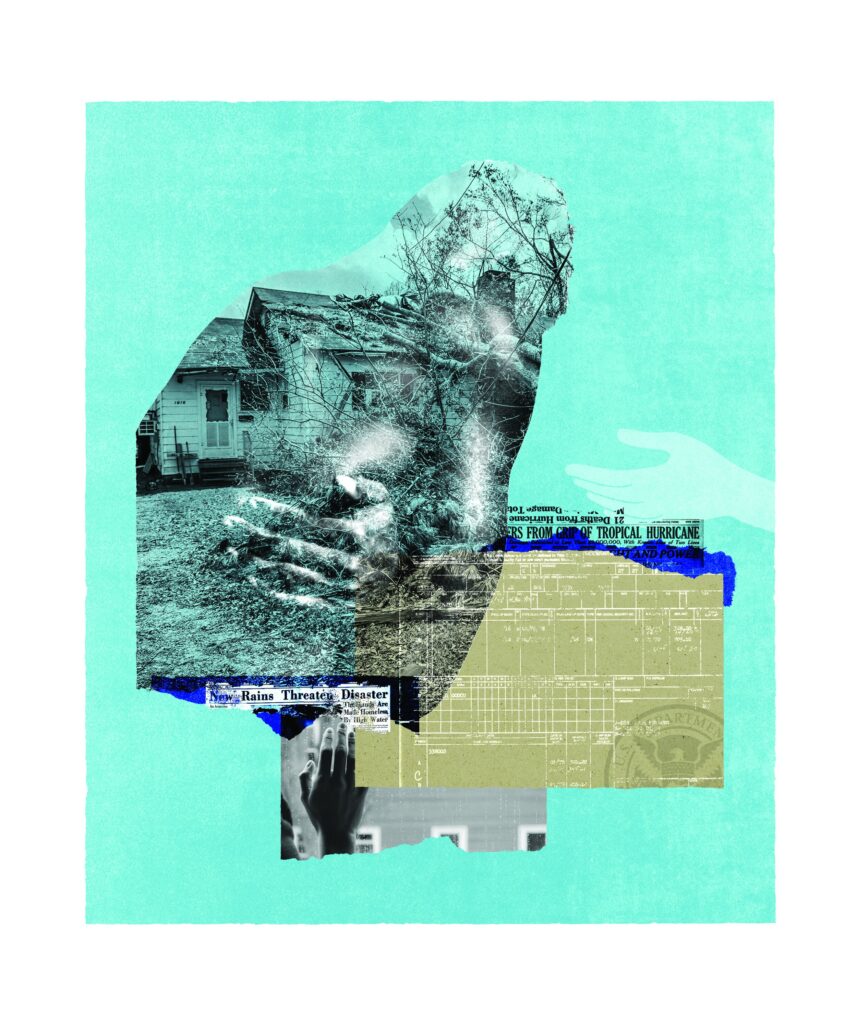By Sara Bongiorni
Illustration by Carolyn Blakley
Suicides on the Northshore spiked sharply more than two years after hurricanes Katrina, Gustav and Isaac and 2016 spring flooding.
A new initiative aims to prevent a wave of suicides in the aftermath of Hurricane Ida by offering free access to online mental health therapy designed to reach Northshore residents at greatest risk from post-Ida struggles.
Data collected through the just-launched WellConnected initiative will shape additional mental health efforts on the Northshore, where suicides have long exceeded the state and U.S. rates.
“We have to jump out ahead and disrupt the pattern,” said Nick Richard, executive director of NAMI St. Tammany, a partner with the Northshore Community Foundation in the new program.
“We know we can save lives.”
The first priority of WellConnected is getting expert help to those who need it, and foundation support is making that happen. It is covering the cost of 90-day subscriptions to a virtual mental health platform called Talkspace that matches individuals in search of help with licensed therapists with relevant expertise.
Program participants meet twice monthly with their therapists via live video sessions using their phone or computer. They also get unlimited text or email access to their therapist for ongoing support over the 90-day subscription period.
“You can reach out at any time and say you are struggling,” said Susan Bonnett, executive director of the Northshore Community Foundation. “There is continuous communication.”
Initial foundation funding will provide access to therapy for 500 residents of St. Tammany, Washington, Tangipahoa and St. Helena parishes, but the foundation is ready to expand the program if those spots fill quickly.
The approach eliminates common obstacles to mental health care, including cost, perceived social stigma and conflicts over workday appointments. Users can schedule therapy sessions outside of work hours when they are at home or in another private setting.
“You access it on your own time,” Richard said.
As elsewhere, therapists are in short supply on the Northshore, an imbalance that has accelerated amid years of rapid population growth across the region. Virtual therapy allows more people to get help quickly despite the on-the-ground capacity shortfall.
Research cited by the National Institutes of Health and others concludes that online therapy is an effective and less costly alternative to in-person care in the treatment of depression, anxiety and other mental health challenges.
The approach is emerging as a standard form of care as U.S. hospitals increasingly use it instead of traditional bedside sessions in their psychiatric units, Bonnett pointed out.
“There is a provider challenge everywhere, and this allows people to get treatment,” she said.
The summer rollout of the WellConnected program is related to the nature of post-disaster trauma.
Mental health struggles tend to build gradually after the adrenaline-fueled early months of emergency response, often reaching a crisis point a year or more later, Richard explained. A grim case in point: Suicides on the Northshore peaked 18 to 24 months after Katrina and other disasters.
“It doesn’t happen overnight,” Richard said.
Comparatively small traumas from insurance headaches to daily encounters with lingering community destruction can lead to growing problems with sleep and alcohol, Richard said. Those problems in turn exacerbate stress and feelings of sadness, even among people who did not lose a home or a job as a result of the storm, he said.
Pandemic uncertainties like school disruptions and health scares were additional burdens after Ida. For individuals without effective coping mechanisms or a certain degree of emotional resiliency, daily setbacks and frustrations can add up to a crushing loss of hope.
Research shows that repeated exposures to small traumas play out in the brain like the major traumatic response known as post-traumatic stress disorder.
“All these things can be life changing,” Bonnett said.
Notably, the demographic group at highest risk for suicide after a disaster—white males between the ages of 40 and 60—is also the least likely to seek help out of fear of appearing weak. Concern about stigma may be an especially formidable barrier to getting therapy on the Northshore in light of its mostly rural and small-town character.
“Everybody knows everybody,” Richard said. “They’re worried they’ll be seen in a therapist’s waiting room or a parking lot.”
Suicide prevention has been a foundation priority more or less since the organization’s founding in 2007 to aid recovery from Hurricane Katrina. Its first foray into civic leadership, for instance, was facilitating a public forum on the issue.
That early effort gave rise to a St. Tammany Parish suicide task force and, in time, voter approval of a St. Tammany public health tax that included a dedication for mental health services.
“It’s been an ongoing negative drumbeat since we started,” Bonnett said.
The new online therapy program isn’t the foundation’s only recent initiative focused on mental health. It is also making grants to Northshore nonprofits to help them develop mental health components that build on their core community work.
Meanwhile, the Talkspace platform at the heart of the online therapy initiative will automatically compile data on diagnoses, treatment and outcomes to lay the groundwork for additional efforts to prevent suicides.
The Northshore-specific data will provide unprecedented insight into what treatment works, understanding that will help the foundation and NAMI pursue grant funding from the NIH and other sources.
“This will give us real data on what to give our citizens to get the large impact we want to make,” Richard said.
Bonnett envisions a cost-effective, evidence-based model that could be replicated across the state, where fewer than 40% of individuals with a mental health diagnosis receive care, according to federal health statistics.
“We hope to develop a replicable model to reach more people, not just in south Louisiana and not just after hurricanes,” Bonnett said. “We are going to see what works.”

